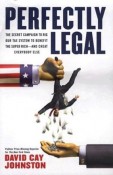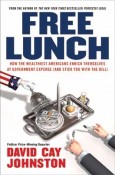Q&A: DAVID CAY JOHNSTON Pulitzer Prize Winning Journalist, Author
Written on April 5th, 2011 |
Aired 04/03/11
Today one of our two major political parties - nationally and in state capitols -- is unwilling to consider raising taxes no matter what the circumstances. Though most of Washington's officials and media are hysterical about the deficit, and willing to hurt anyone in an effort to reduce it, both parties voted in December to extend tax breaks for the wealthiest Americans for two more years.
I last interviewed today's guest, Pulitzer Prize winning tax writer, DAVID CAY JOHNSTON in January 2009 on the day of Barack Obama's inauguration, We talked then about how we could make the most of the opportunity presented by the financial catastrophe. Did the bailouts make sense? and What could we do that would be smarter, more efficient, more effective - that might work?
DAVID CAY JOHNSTON worked as an investigative reporter for several newspapers. He was with the Los Angeles Times from 1976 to 1988, and at the New York Times from 1995-2008 where he won a Pulitzer Prize for his innovative coverage of our tax system He now teaches the tax, property and regulatory law of the ancient world at Syracuse University College of Law and Whitman School of Management and writes a column at tax.com. He is the author of two bestsellers, Perfectly Legal and Free Lunch. His next book, The Fine Print, will be published in 2011.
Q&A: DAVID CAY JOHNSTON – Pulitzer Prize Journalist / Author
Written on January 22nd, 2009 |
Aired 01/20/09
DAVID CAY JOHNSTON, who won a Pulitzer Prize for his innovative coverage of our tax system, retired this year as a investigative reporter for The New York Times. He is the author of PERFECTLY LEGAL: The Covert Campaign to Rig Our Tax System to Benefit the Super Rich--and Cheat Everybody Else and FREE LUNCH: How The Wealthiest Americans Enrich Themselves at Government Expenses (and Stick You with the Bill).
DAVID CAY JOHNSTON knows about money, finances, and the economy. More than anything else, he knows about taxes. We'll talk about how we can make the most of the opportunity presented by our current financial catastrophe. Do the bailouts make sense? What could we do that would be smarter, more efficient, more effective - that might work?
